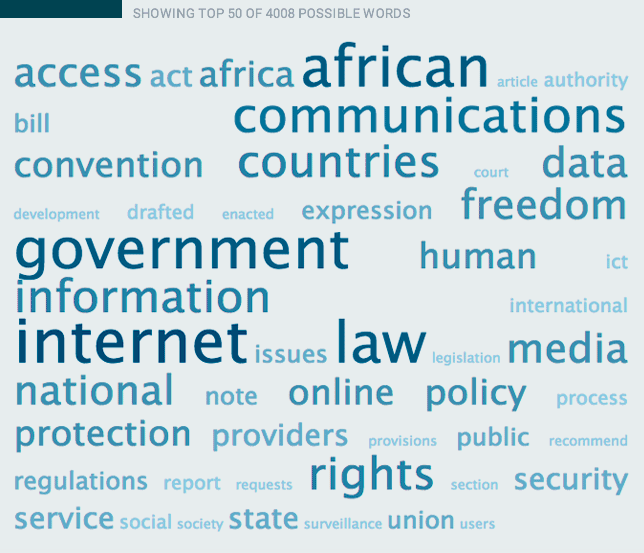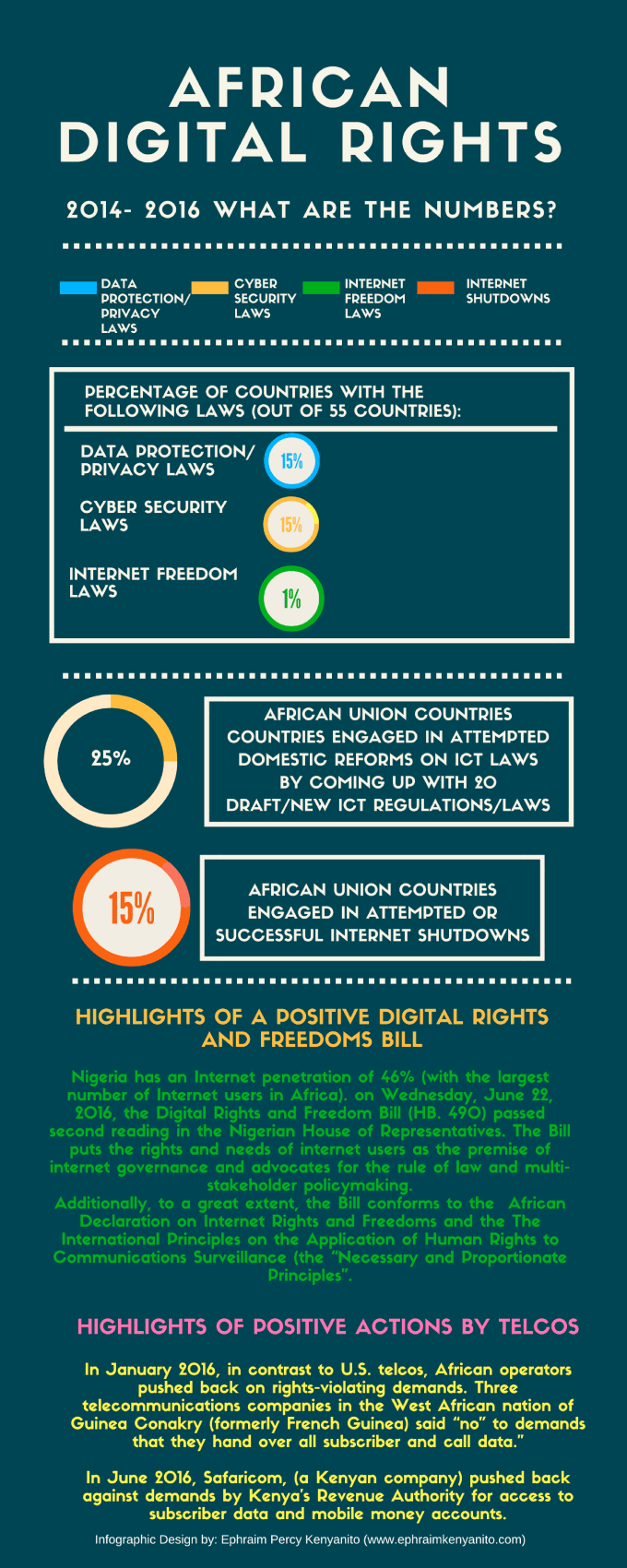


|
||
|
||
Almost three years ago, I published a blog post on CircleID titled “Internet Governance: Why Africa Should Take the Lead.” I argued that African Internet stakeholders use a ‘wait and see approach’ in matters as critical as Internet governance,” and that African voices are missing in key Internet governance discussion fora. Additionally, I suggested that some reasons for this approach, including that Africa lacks well-trained Internet governance experts and Africans see foreign affairs and international relations as an East versus West dynamic. I further urged for a change in this situation, as the “wait and see approach” is gravely interfering with the basic human rights of Africans.
As a follow-up to the post above, and building on previous work on the African Media Law and Digital Native Roundup with the University of Pennsylvania, this post is a summary of a major forthcoming publication focused on the 2014-2016 period that highlights the regional trends concerning Internet governance and information and communications technology (ICT) policymaking processes in Africa.
This post is divided into two parts. The first relays my observations about trends over the past three years in African ICT policy, human rights, and development processes, and highlights key challenges and opportunities. The second provides recommendations for African citizens on what can be improved.
* * *

What are the key processes and trends?
 African Digital Rights, designed by Ephraim Percy Kenyanito (Click to Enlarge)Over the past three years, there have been key policy and advocacy processes across the world that have both direct and indirect implications on African Internet governance and ICT policymaking processes, including: African Union Agenda 2063; African Convention on Cyber Security and Personal Data Protection; NETmundial; the African Declaration of Internet Rights and Freedoms; the Feminist Principles of the Internet; International Telecommunication Union (ITU); ICANN events in Africa; the renewal of the UN Human Rights Resolution on the Internet; Global Forum on Cyber Expertise; the BRICS Summit; the Open Government Partnership; Freedom Online Coalition; and the Community of Democracies. The existence of these processes show the importance of access to the Internet to the advancement of socio-economic, political, and gender rights in Africa. In sum, Africa is on a trajectory toward better Internet access but on a downward trajectory in terms of human and digital rights.
African Digital Rights, designed by Ephraim Percy Kenyanito (Click to Enlarge)Over the past three years, there have been key policy and advocacy processes across the world that have both direct and indirect implications on African Internet governance and ICT policymaking processes, including: African Union Agenda 2063; African Convention on Cyber Security and Personal Data Protection; NETmundial; the African Declaration of Internet Rights and Freedoms; the Feminist Principles of the Internet; International Telecommunication Union (ITU); ICANN events in Africa; the renewal of the UN Human Rights Resolution on the Internet; Global Forum on Cyber Expertise; the BRICS Summit; the Open Government Partnership; Freedom Online Coalition; and the Community of Democracies. The existence of these processes show the importance of access to the Internet to the advancement of socio-economic, political, and gender rights in Africa. In sum, Africa is on a trajectory toward better Internet access but on a downward trajectory in terms of human and digital rights.
Trends on access to the Internet
Across Africa, despite the increase in Internet penetration through various strategies such as those in Botswana and Kenya; governments (such as Ethiopia, Uganda and Togo) and non-state actors (such as the extremist Somali militia Al-Shabaab) have attempted to roll back these gains to prevent transparency and accountability.
Given this challenge, it has been necessary for Africans stakeholders to take the lead at addressing solutions going forward, such as by drafting a joint letter, and producing the African School on Internet Governance (AfriSIG) October 2016 Statement on an intentional Internet Shutdown relevant to national stakeholders and authorities at the African Union and the United Nations, among others.
Trends on multi-stakeholder policymaking
Recent research on multi-stakeholder policymaking processes have identified gaps in Africa, which can be addressed by citizens being at the forefront in demanding their rights to participate in an organized manner. As I noted, “In 2013, a draft African Union Convention on the Confidence and Security in Cyberspace (AUCC) ... was scheduled to pass during an AU meeting in January 2014, but was delayed as a result of protests from the private sector, civil society organizations, and privacy advocates who had very little involvement in the process.”
Trends on intermediary liability, business, and digital rights
A June 2016 publication on the Association for Progressive Communication (APC) stressed that there were attempts at imposing intermediary liability on businesses, which would affect human rights across Africa. As I previously wrote: “In contrast to U.S. telcos, African operators push back on rights-violating demands. Three telecommunications companies in the West African nation of Guinea Conakry (formerly French Guinea) just said “no” to demands that they hand over all subscriber and call data.”
Trends on cybersecurity, rule of law, and human rights
With the adoption of the 2014 African Union Convention on Cyber Security and Personal Data Protection, a trend of enacting cybercrime legislation has emerged across Africa. This convention is now at the stage where it is undergoing ratification across various national assemblies in African Union member countries, which will take effect after the 15th instrument of ratification has been deposited at the African Union. For example, in Sub-Saharan Africa, 13 countries engaged in attempted domestic reforms on ICT laws by coming up with 20 draft/new regulations/laws between the June 2014 and September 2016 period.
Trends on freedom of expression
While enacting the abovementioned laws, governments have inserted provisions that can extend criminal libel/defamation to apply online, which is having a chilling effect on online speech. This negative development has been further enhanced by vague legislation banning “misuse of telecommunication gadgets,” which I wrote: “[Such laws] represent a powerful tool for silencing the voices of people who are dissenting from the government or otherwise critiquing those in power.”
Trends on privacy and data protection
We can note that not more that 20 African governments have enacted privacy and data protection legislation, a reality that has not changed much over the past three years.
Moving forward: What should citizens and civil society do differently to achieve more equal and just societies in Africa?
This article was originally published on ephraimkenyanito.com and Medium.
Sponsored byVerisign

Sponsored byRadix

Sponsored byIPv4.Global

Sponsored byWhoisXML API

Sponsored byDNIB.com

Sponsored byCSC

Sponsored byVerisign
